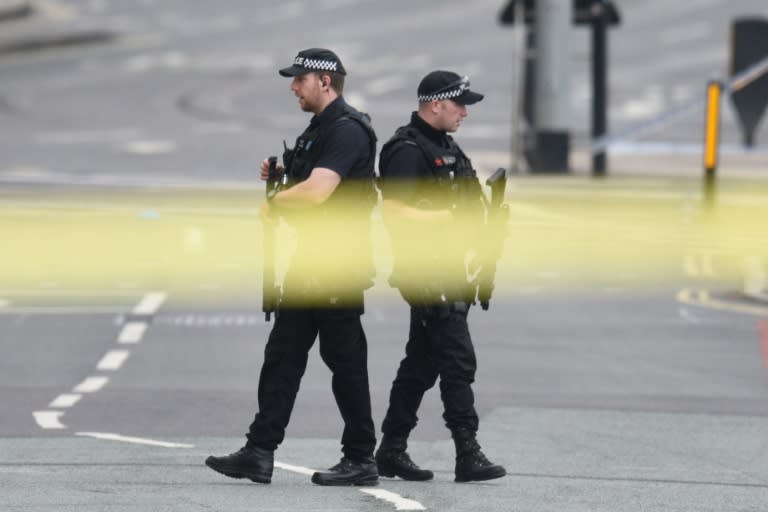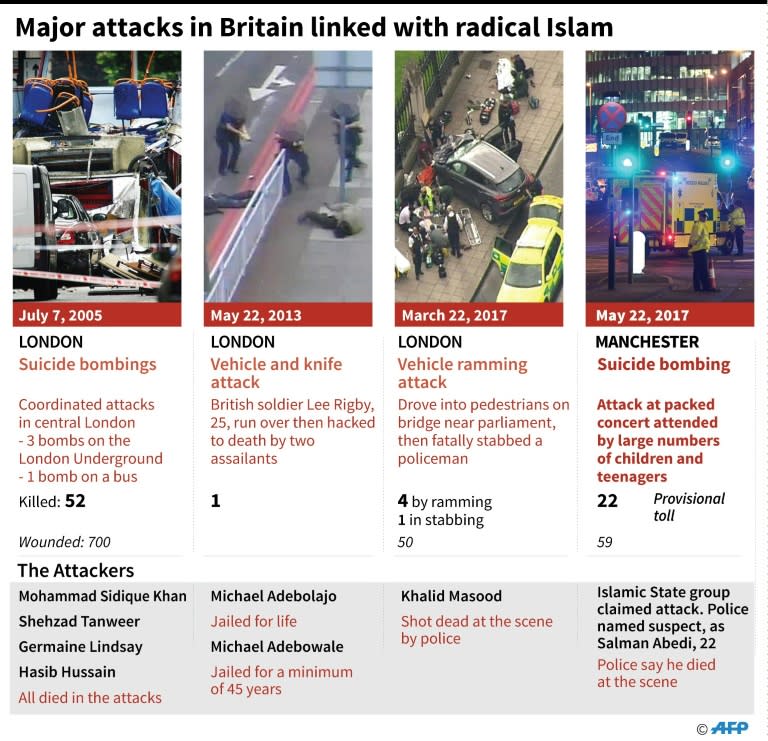Manchester terror attack: What we know
Twenty-two people, including children, were killed in a suicide bombing at a pop concert packed with teens in the British city of Manchester late Monday. Here is what we know so far about the terror attack, the deadliest in Britain since 2005. - What happened? - Police said they were called at 10:33 pm (2133 GMT) Monday to reports of an explosion at Manchester Arena during a concert by US pop star Ariana Grande, who is popular with teenagers and pre-teens. Witnesses described a "huge bomb-like bang" and scenes of panic as young fans rushed out and parents waiting outside searched frantically for their children. According to police, the blast occurred "within the foyer area of the stadium", although the venue said it was in a public area outside. Prime Minister Theresa May said it was near one of the arena exits. The foyer connects the 21,000-capacity auditorium with Victoria train and tram station, a major transport hub on the northern edge of the city centre. It remained closed on Tuesday. - Who is behind it? - Greater Manchester police chief Ian Hopkins on Tuesday named the attacker as 22-year-old Salman Abedi, adding that he died while setting off "an improvised explosive device". "The priority remains to establish whether he was acting alone or as part of a network," he said. According to media reports, Abedi was the third of four children, born in Manchester to Libyan parents, who fled their country to escape the regime of former dictator Moamer Kadhafi. The so-called Islamic State group claimed responsibility through its social media channels, saying "one of the caliphate's soldiers placed bombs among the crowds", and threatening more attacks. Manchester police also announced the arrest of a 23-year-old man as part of their investigation and said they had held a "controlled explosion" at the scene of a raid. According to the Guardian newspaper, police raided a house in the neighbourhood where Abedi was believed to have lived, as well as the home of the arrested suspect's brother in south Manchester. The brothers reportedly attended a mosque in Didsbury. It is the latest in a string of atrocities that have hit Europe in recent years, several claimed by the Islamic State group. - Who are the victims? - May said the 22 dead and 59 injured included "many children and young people". Eight-year-old Saffie Rose Roussis is so far the youngest reported victim. She reportedly attended the concert with her sister, believed to be in her 20s, and mother. Chris Upton, her primary school headteacher, described Saffie as "a beautiful little girl in every sense of the word". "She was loved by everyone and her warmth and kindness will be remembered fondly." Georgina Callander, 18, who was studying health and social care, was the first victim to be named. PM May condemned the attack for its "appalling sickening cowardice" and for "deliberately targeting innocent defenceless children and young people". - What next on security - Britain's threat level remains at "severe", meaning an attack is highly likely, but this will remain under review, May said. "The police and others will of course be looking at the security of venues" and the government will review police resources, May said during a visit to Manchester. Major sports venues in Britain plan to beef up security, with several high profile events in the coing weeks, including the FA Cup final at Wembley on Saturday. Manchester United's Europa League final against Ajax in Stockholm on Wednesday is still set to go ahead. UEFA, European football's governing body, said "tight security arrangements" had long been in place. Downing Street said May will still attend the NATO summit in Brussels on Thursday and the meeting of G7 leaders in Sicily, Italy on Friday and Saturday. - Other attacks on UK soil - The incident is Britain's second terror attack in less than two months. On March 22, five people were killed and more than 50 injured when a man drove into pedestrians on Westminster Bridge in central London, before crashing into the fence surrounding parliament. The attacker, 52-year-old Khalid Masood, fatally stabbed a police officer before being shot dead by police outside parliament. Investigators described that attack as "Islamist-related terrorism" but said they may never know why he did it and have not charged anyone over the incident. The deadliest bomb attack on British soil took place on July 7, 2005 when four British suicide bombers inspired by Al-Qaeda attacked London's transport system, killing 52 people and wounding 700.



